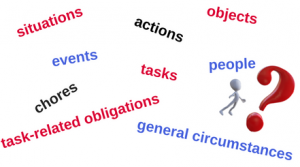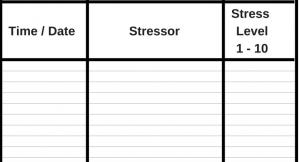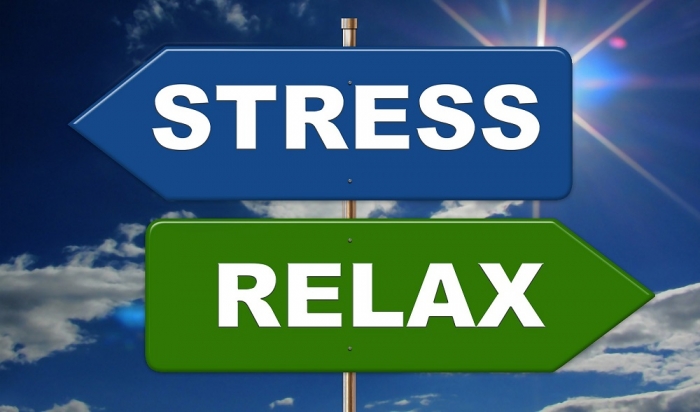Welcome to Part 2 of our Stress Management series. In Part 1…

Stress Management: Cool & Calm Strategies (Pt. 1 of 2)
2.
Stress Management: Cool & Calm Strategies (Pt. 1 of 2)
Do you find yourself in unavoidable high-stress situations? You feel you have to think fast, respond quickly and say the right thing now — not regret later what you wish you had or had not said. Many of us have been there!
In this post, I’ll show you how Stress Management Cool & Calm Strategies enable you to stay cool & calm, clear-thinking and at your best no matter what pressures surround you.
Be like a duck: Calm on the surface
but always paddling like the dickens underneath.
This is the clever wisdom of British film icon, Sir Michael Caine.
Good to know this suave celebrity’s secret for managing stress, isn’t it?
Cool & Calm
Celebrities in top positions in any field certainly are under a lot of stress. Yet rarely do they exhibit telltale signs. Why is that?
Being “under stress” is having external stress, such as work or home-related responsibilities.
The way you feel inside is internal stress.
Not allowing external stress to invade your precious inner well-being is the way to control internal stress.
It is possible to acquire steady, cool & calm composure, irrespective of the external stressors.
Important: Our approach is not to mask internal stress but to manage and even eliminate it.
Would you like to discover how . . .
To stay cool & calm under fire?
To succeed in managing chronic stress for good?
You can accomplish this with Stress Management strategies. First, you follow the steps. Then the strategies become second nature — celebrity style.
In this post, you will learn:
• What is Stress Management?
• What are the common obstacles to successful Stress Management?
• How can you stay cool & calm with Stress Management strategies?
Stress Management is . . .
The process of controlling the way you react to common stressors present in everyday life.
It is an active and continuous practice and can become a natural part of your personality.
The main objective of Stress Management is . . .
To revamp your thought patterns and lifestyle progressively, so you will no longer suffer from chronic, toxic stress on a daily basis.
Like other major endeavors, Stress Management is not without its challenges.
That’s why it’s important to prepare yourself adequately for this important commitment.
If you don’t, you’re going to end up being disappointed with the results.
Please don’t let that happen to you.
Now, don’t worry. We’ve isolated the common barriers to success and the most effective ways for you to dissolve them. Just follow along and you are on your way to a freer, happier, more productive experience both in your workplace and at home.
By the way, Stress Management is an art. It’s the result of your own self-reflection and honest self-expression. That makes it unique to you. But there are very practical tips that ensure your success.
Top 3 Stress Management Strategies to Stay Cool & Calm
Here are some Cool & Calm strategies to help obliterate the obstacles to consistently successful Stress Management:
#1 Cool & Calm Strategy: Record Your Stressors
Each person has his own set of stressors, unique to him, whether in the workplace or at home:
Awareness of your stressors is your first step to personalizing your Stress Management. You need to know the cause to get to the cure.
To make things more organized and manageable, I would advise you to create a Stress Management journal. In fact, you can call it your Cool and Calm Stress Management Journal, just to remind yourself of your goal.
What Does a Stress Management Journal Look Like?
Evaluating your stress level is of paramount importance.
One part of your journal should be separate and devoted specifically to recording stressors. Each page should have three columns with the following headings:
Rate yourself from 1 to 10, like this:
“1” if you are only mildly annoyed for a brief period of time.
“10” if you experience not only mental signs but also physical signs of stress, such as a racing heart rate, jittery stomach, or cold hands and feet.
Is It Challenging to Maintain a Stress Management Journal?
Bear in mind: Your Stress Management journal should not be difficult to maintain. The journal is your own special, personal reflection.
 Hey, it’s free, it’s natural, and it’s private.
Hey, it’s free, it’s natural, and it’s private.
By the way, if your practice of recording and journaling stresses you out, it’s possible you’re just overdoing it. Try to relax, stay cool and calm, and objectively review your actions.
Now, you don’t have to record every little stressor that comes your way – just the ones you remember at the end of the day. You know, the little gremlins that tend to impact your well-being.
How Often and When?
Once a day. Some people write in their journals every few hours. However, if you’re like most people, you’re probably unable to do this. That’s okay.
Write only when it’s convenient for you. You are not in competition with anyone on this.
Just be sure you write in your Stress Management journal every day. This way, you will be consistently successful with Stress Management.
#2 Cool & Calm Strategy: Acknowledge Your Personal Beliefs & Values
The battle against stress will be much easier if you come to terms with your personal beliefs and value system.

Many of us unconsciously harbor negative beliefs and old values that really do not support our current goals.
“Me? Negative beliefs? My beliefs aren’t negative,” you might say.
We didn’t consciously put them there. But we can honestly identify them and consciously change them for the better.
Below are common beliefs and values that can directly impair your ability to manage stress. Check out these common beliefs
Do you identify with any of these beliefs and values?
1. “I have more important things to do than manage stress.”
2. “Stress Management won’t bring food to the table, my work does that.”
3. “I have no time left for this sort of thing.”
4. “I’d rather sleep than try to manage stress.”
5. “I’m a hopeless case!”
6. “I’m not very good at learning new things.”
7. “How will I know if this will work?”
8. “Stress Management is just not ‘my thing’.”
9. “I think it’s tedious and boring.”
10. “I don’t have the energy to think about it.”
Try to let go of any negative belief.
Open the door to welcome relief.
Remind yourself: Life works better on the positive side.
#3 Cool & Calm Strategy: Take Action — the First Steps
Lastly, Stress Management is not just a vague concept – it’s a set of special, practical skills.

Take your first steps. Today in Part 1 of Stress Management, we awakened the basic hallmark of a cool & calm demeanor: self-awareness.
Practice the steps as we go along and you will be able to avoid or moderate your stress response.
Long-term benefits: You will be healthier, happier and more productive.
How Long Will It Take to Master Stress Management?
You know, Stress Management has spawned a whole industry of mentors and coaches. Why? Because it’s not something one learns overnight.
The habit of stress, and it is a habit, can be a stubborn companion to a way of thinking. With this in mind, it logically follows that you must truly want to take control and manage your stress for a healthier mind, body, and experience of life.
You will see results if you begin and maintain consistency. Take the first few baby steps.
Managing chronic stress does not require a lot of time in daily practice.
You can accomplish a lot within a 20-30 minute timeframe.
If 20 minutes sounds overwhelming, just chunk it down. Try limiting your stress management sessions to 10-15 minutes. This should give you enough time to think about the stressors you encountered for the day and the way you reacted to them.
Consistency is more important than the amount of time.
Just be sure you focus on your personal stressors and let go of any negative blocks that we mentioned in Step 2.
Self-Analysis Is Your Most Important Tool in Managing Stress
Remember: You must be honest with yourself. If you want to remain truly cool and calm, and not just mask your inner stress, you must be true to yourself.
Make it a point to identify harmful thoughts and behaviors so you can modify them. Be like a third person, an alter ego, your other self, catching and correcting you. Avoid justifying any habitual, negative responses to stressors as this will just offset your personal breakthroughs.
Behavioral modification is gradual but very real. To enjoy results, you must be consistent in detecting the stressors and your responses. Then begin enforcing a new, more positive replacement behavior.
Oh, yes, I almost forgot: Be sure to reward yourself when you succeed in replacing a behavior. You deserve it!
The Takeaway:
Your first 3 strategies to succeed with your Stress Management:
• Awareness of your stressors — reflect
• Acknowledgment of your negative personal beliefs – be honest with yourself
• Action – put your plan into practice
Part 2 of our series on Stress Management will provide 4 practical guidelines to ensure your complete success in managing chronic stress. See you there.
But first …
What is your most common experience of stress on a daily basis?
We welcome your comments in the box below
By the way, have you accessed your

10 Stress Habits and Alternatives!
If not, click here


An outstanding share! I have just forwarded this onto a friend who had been conducting a little homework on this. And he actually ordered me lunch simply because I discovered it for him… lol. So allow me to reword this…. Thanks for the meal!! But yeah, thanx for spending time to talk about this topic here on your website.
Everything is very open with a clear description of the issues. It was definitely informative. Your site is very useful. Thank you for sharing.
There are certainly a lot of details like that to take into consideration. That is a great point to bring up. I offer the thoughts above as general inspiration but clearly there are questions like the one you bring up where the most important thing will be working in honest good faith. I don?t know if best practices have emerged around things like that, but I am sure that your job is clearly identified as a fair game. Both boys and girls feel the impact of just a moment?s pleasure, for the rest of their lives.
Leading Digital Marketing agency in India and Kolkata, Leading Web Design company. Providing web designing and Digital marketing services, Digital marketing course, and certification with an internship.